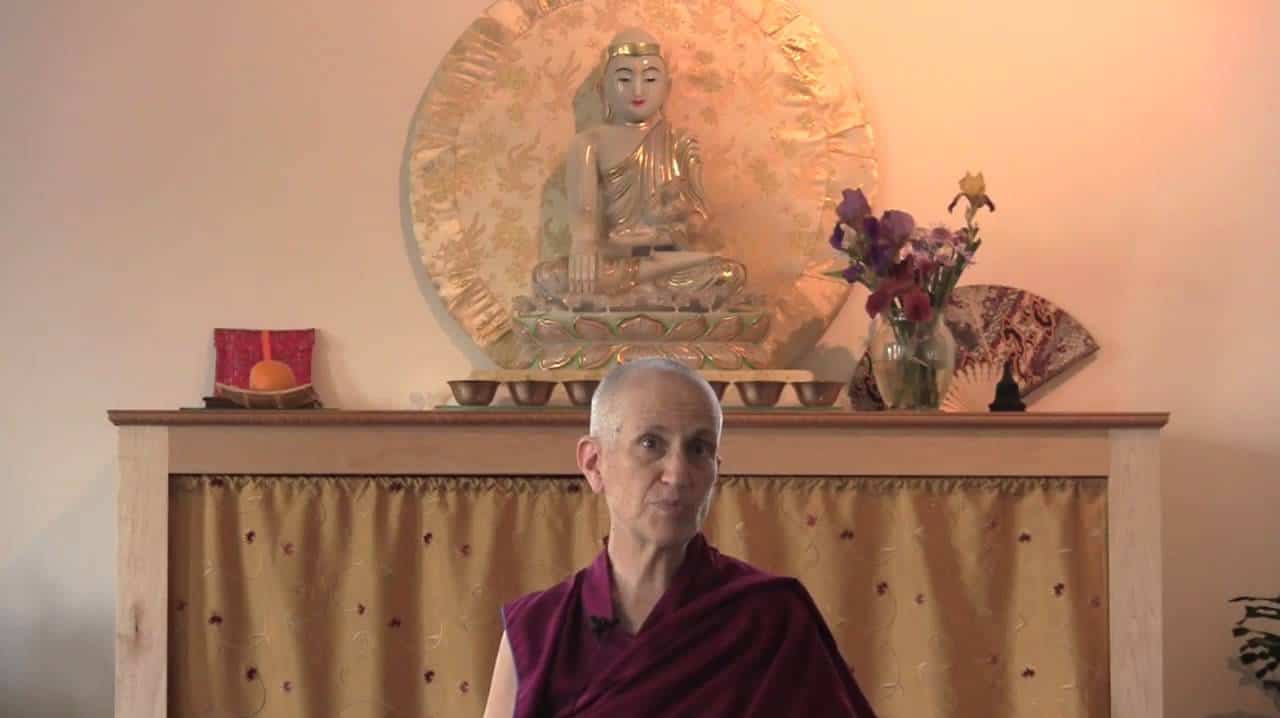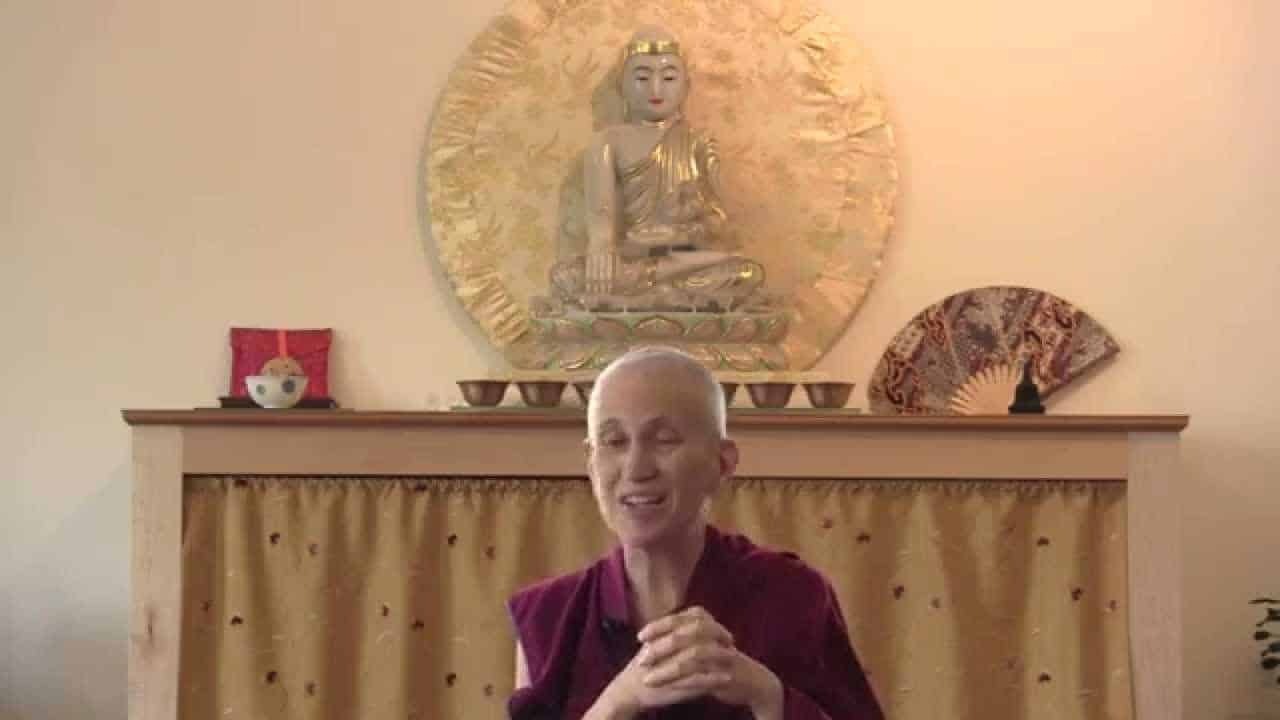Verse 10: Misleading friends
Part of a series of talks on Gems of Wisdom, a poem by the Seventh Dalai Lama.
- Misleading friends are people who like us, but don’t agree with our spiritual values
- Due to attachment we may let them lead us away from our spiritual goals
Gems of Wisdom: Verse 10 (download)
We’ve been having a few verses here about relationships with people. Here’s another one: “What demon possesses one and repays friendship with pain?” He’s not talking about a specific attitude here.
What demon possesses one and repays friendship with pain?
Misleading friends who only increase one’s negative karma and afflictions.”
When we extend friendship to somebody, then who repays that friendship with pain? Usually we think it’s the person who criticizes us and points out our faults and disagrees with us, and so on. Here that’s not who he’s saying is the person who is the demon that repays friendship with pain. Here it’s the misleading friends. And misleading friends are the ones who are really nice to us, but have different values, and different world views.
- They’re the people when you go to work after coming back from retreat who say, “You spent your whole vacation sitting in a room looking at your belly button, meditating? How ridiculous. Go get a life.”
- Misleading friends are the ones who say, “You’re interested in Buddhism? You know, you’re going to go to hell for that. I’m just being compassionate and telling you because I care. You’re on the wrong path. Come to church with me.”
- Misleading friends are the ones who say, “Oh, you gave such a large donation to a charity? That’s ridiculous. You could have gone on vacation with that money.”
- Misleading friends are the ones who say, “Oh, you know, you could have just tweaked the truth a little bit with that. Nobody would have known.”
Misleading friends are the ones who appear to care for us and like us, but because they don’t understand past and future lives, because they think only of this life and value success in terms of money and status and so on, because their ethical system is such that it’s bad when other people lie and steal but it’s okay when we do if it’s to our own benefit and nobody else finds out. People like that who are very, very nice, and they’re just kind of regular people and we socialize with them and so on, they’re the ones who are considered the misleading friends, or the bad friends.
Whereas sometimes the people who come to us and say, “You know, your ethical conduct is slipping.” Or, “You’re fudging the truth.” Or, “You value vacation more than you do your spiritual practice?” Those people we get defensive and prickly about and say, “Mind your own business! Leave me alone. Don’t criticize me.” But what they’re actually doing is pointing out to us things that we need to listen to and pay attention to in our own behavior that we’re blocking and being undiscriminating about. Whereas the misleading friends are so nice, so comradery, they don’t see themselves as misleading. And we don’t either. But we become like them, we listen to their advice and then we wind up going down the wrong road.
So, another one from my mother, “Birds of a feather flock together.” And she’s right. We become like the people we hang out with.
That doesn’t mean that we spurn the people who are seemingly our friends but giving us bad advice. We’re polite to them, we can be congenial with people, but we don’t make those people our close friends. And when they give us advice we just say, “Thank you very much,” and then change the subject, because if you start debating with them it doesn’t work, and so on. But by saying, “Thank you very much,” it also doesn’t mean that you’re listening to them and you’re going to follow that advice. We don’t need to get defensive with them, we don’t need to get aggressive with them, but we also don’t need to go along with them. Instead, we should choose as our friends the people whom we want to become like. In other words, people who have good values and good qualities, who are good examples for us, because if we hang around those people and make those people our friends, then naturally the birds of a feather will flock together. and we will become like them.
Many people when they meet the Dharma, and they’re getting their own values and ethics clearer maybe for the first time in their life—maybe not—but then they look back at their old friends and they go, “Hmmm, hmmm….” “Those are my friends that I used to go drinking and drugging with. Hmmmm.” And then you realize, “Oh, actually, I don’t have a lot of other friends who don’t drink and drug because that’s what we always used to do to have fun together. That was the common currency in which we all partook and where we had a lot of fun. We would all go drinking and drugging, or we’d all go to these wild parties, we would all go gambling, or we’d all go to roam the streets….” Or whatever it is. And it’s like, “Oh, I don’t have friends who don’t do that….” And then it’s like, “Well, who am I going to be friends with?” And sometimes then you also start feeling guilty, like, “Oh but we were such good friends, and if I’m not friendly to them anymore then….” Well first, “Who will I be friends with?” And second of all, “They’ll feel hurt and I don’t want to hurt their feelings.” So then we make up all sorts of reasons why. “Well, I’ll only go out with them to the bar, but I won’t order anything to drink. But I’ll maintain the friendship anyway.” Right. You’re going to go to the bar with your drinking buddies, who you used to drink with, at a place where you used to drink, and all of a sudden you’re not going to drink? When they’re drinking? Okay…. And when they say to you, “Oh, come on, it’s just a little bit. One beer, whatever, no harm.” And you think, “Well yeah, they’re right, it’s only one. I won’t get drunk.” And then before you know it, you’re plastered.
So sometimes in the beginning of Dharma practice it’s really hard to start making new friends and to find a way to relate to the people we used to relate with but without hanging around them in the same ways that we used to, and probably without being as close to them as we used to be. Because we’re growing in different directions. So again, we can remain polite and friendly on the surface, but we don’t make those people our dear friends and the people we’re close to because then out of habit we’ll keep doing the same things that we used to do before when we’re around them.
We were talking the other day about family in that regard, and how family knows exactly how to push our buttons, and how we know exactly how to go into our old roles with our family. Where we’re playing out the same old thing that we’ve done for the last—however old we are minus two—years. And how hard it is to change when we keep putting ourselves in a very familiar situation that we know will bring up these old habits that are not in our own benefit when we act according to those habits.
So this is hard at the beginning. But it gradually becomes easier. And usually our friends don’t mind at all. At least that was my experience. Because they want to be with the other people who are drinking and drugging, and so I’m not so interesting anymore. So it’s not like they keep calling and saying, “Oh come on, come on.” They just say, “Okay…. Where is the next joint, I’m going with that person.” So it’s not really such a big deal.
Venerable Thubten Chodron
Venerable Chodron emphasizes the practical application of Buddha’s teachings in our daily lives and is especially skilled at explaining them in ways easily understood and practiced by Westerners. She is well known for her warm, humorous, and lucid teachings. She was ordained as a Buddhist nun in 1977 by Kyabje Ling Rinpoche in Dharamsala, India, and in 1986 she received bhikshuni (full) ordination in Taiwan. Read her full bio.


